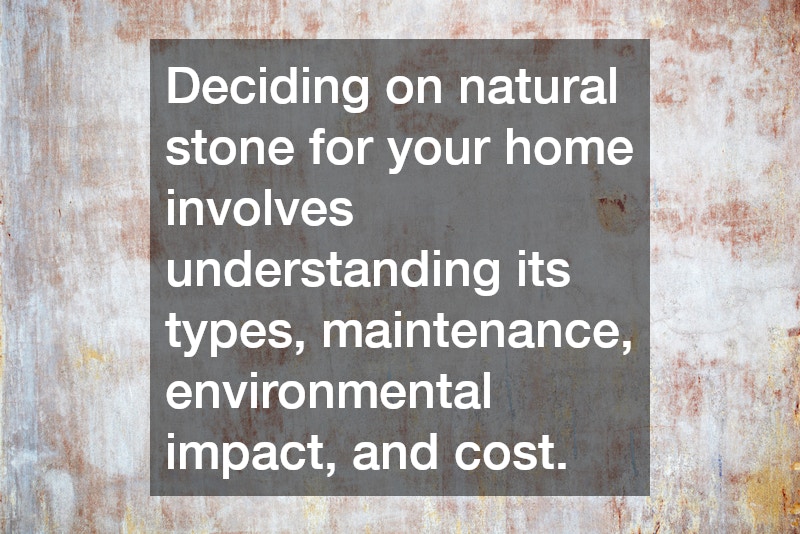Naturally beautiful and timeless, natural stone can be a stunning addition to any home. However, there are several important factors to consider before making a decision. This article will guide you through essential insights and answers to common questions about using natural stone in your home. Beyond its visual appeal, natural stone carries a legacy of strength and craftsmanship that has been valued for centuries.
From ancient architecture to modern design, its presence communicates both sophistication and permanence. By learning about its care, sustainability, and cost, you’ll be better equipped to determine if natural stone is the right choice for your home’s needs and lifestyle.
Proper Maintenance Preserves Natural Stone
Proper maintenance of natural stone begins with regular cleaning to preserve its appearance and durability. Using mild, pH-balanced cleaners is essential to avoid damage to the stone’s surface while effectively removing dirt and grime. To maintain the stone’s natural luster, regular dusting and wiping with a soft cloth are recommended. Avoid using abrasive or acidic cleaners, which can erode the stone and diminish its natural beauty over time. For best results, it’s advisable to follow the manufacturer’s specific cleaning guidelines for your type of stone. Additionally, sealing the stone periodically can enhance its resistance to stains and scratches.
Managing stains on natural stone requires prompt attention to prevent permanent damage. Blotting spills immediately and using a poultice to draw out deep stains can be effective. It’s crucial to identify the type of stain to choose the appropriate cleaning method, as different substances require specific approaches. For instance, oil-based stains may necessitate a different treatment than organic stains. In case of more significant damage, such as cracks or chips, professional repairs might be necessary to restore the stone’s integrity. Routine inspections and immediate repairs can help maintain the stone’s longevity.
Natural Stone Can Be a Sustainable Choice
The sustainability of natural stone largely depends on the practices employed by stone quarries. Some quarries have adopted environmentally-friendly methods, reducing the impact on local ecosystems and promoting responsible natural resource management. Before purchasing natural stone, consumers should research the quarrying process and select suppliers that prioritize sustainability. Responsible quarrying practices not only help preserve the environment but also ensure the availability of natural stone for future generations. Additionally, some companies offer certifications or transparency reports, providing consumers with confidence in their purchases. Supporting sustainable stone quarries contributes to environmentally conscious home improvements.
Natural stone is renowned for its exceptional durability, often outlasting many other building materials. It requires minimal replacement, which contributes to its eco-footprint by reducing waste and resource consumption. The stone’s longevity also adds to its value; a well-maintained stone surface can last for decades, reducing the need for frequent renovations. Homeowners can feel confident that their investment in natural stone will pay off over time. Furthermore, the durability of natural stone makes it an ideal choice for areas with high foot traffic, as it retains its elegance without showing significant wear. Its enduring nature ensures that both functionality and aesthetics are preserved throughout the years.
The Cost of Natural Stone Reflects Its Value
Investing in natural stone involves an initial financial commitment that varies based on the type of stone and installation complexity. High-quality stones, such as marble and granite, typically command higher prices due to their luxurious appearance and desirable properties. Although the upfront costs may seem higher compared to other materials, natural stone’s unique characteristics and long-term benefits often justify the investment. Consumers should consider the product’s quality, sourcing, and installation when calculating total expenses. Shopping around and obtaining estimates from multiple suppliers can help homeowners find competitive prices and balance quality with cost-effectiveness. Understanding the investment required helps in making an informed decision aligned with budgetary constraints.
The long-term value of natural stone is reflected in its ability to enhance a home’s resale potential and aesthetic appeal. This durable material can significantly increase a property’s marketability, often justifying its higher upfront costs. Natural stone’s timeless appeal and enduring nature make it a worthwhile addition for homeowners seeking both style and investment value. Over time, the appreciation in home value can offset the initial expenditure on stone materials. Additionally, potential buyers are often willing to pay a premium for homes featuring high-quality natural stone elements, recognizing the advantages of durability and reduced maintenance. Investing in natural stone can be a strategic choice for those looking to add both beauty and value to their surroundings.
Deciding on natural stone for your home involves understanding its types, maintenance, environmental impact, and cost. By exploring these facets, you can make an informed decision that enhances your home’s beauty and longevity. Ultimately, natural stone is more than just a building material—it’s an investment in elegance, resilience, and long-term value. Its enduring qualities can enrich both daily living and future resale potential. With the right knowledge and care, natural stone can transform your home into a space that balances timeless charm with practical benefits.
Naturally beautiful and timeless, natural stone can be a stunning addition to any home. However, there are several important factors to consider before making a decision. This article will guide you through essential insights and answers to common questions about using natural stone in your home. Beyond its visual appeal, natural stone carries a legacy of strength and craftsmanship that has been valued for centuries.
From ancient architecture to modern design, its presence communicates both sophistication and permanence. By learning about its care, sustainability, and cost, you’ll be better equipped to determine if natural stone is the right choice for your home’s needs and lifestyle.
Proper Maintenance Preserves Natural Stone
Proper maintenance of natural stone begins with regular cleaning to preserve its appearance and durability. Using mild, pH-balanced cleaners is essential to avoid damage to the stone’s surface while effectively removing dirt and grime. To maintain the stone’s natural luster, regular dusting and wiping with a soft cloth are recommended. Avoid using abrasive or acidic cleaners, which can erode the stone and diminish its natural beauty over time. For best results, it’s advisable to follow the manufacturer’s specific cleaning guidelines for your type of stone. Additionally, sealing the stone periodically can enhance its resistance to stains and scratches.
Managing stains on natural stone requires prompt attention to prevent permanent damage. Blotting spills immediately and using a poultice to draw out deep stains can be effective. It’s crucial to identify the type of stain to choose the appropriate cleaning method, as different substances require specific approaches. For instance, oil-based stains may necessitate a different treatment than organic stains. In case of more significant damage, such as cracks or chips, professional repairs might be necessary to restore the stone’s integrity. Routine inspections and immediate repairs can help maintain the stone’s longevity.
Natural Stone Can Be a Sustainable Choice
The sustainability of natural stone largely depends on the practices employed by stone quarries. Some quarries have adopted environmentally-friendly methods, reducing the impact on local ecosystems and promoting responsible natural resource management. Before purchasing natural stone, consumers should research the quarrying process and select suppliers that prioritize sustainability. Responsible quarrying practices not only help preserve the environment but also ensure the availability of natural stone for future generations. Additionally, some companies offer certifications or transparency reports, providing consumers with confidence in their purchases. Supporting sustainable stone quarries contributes to environmentally conscious home improvements.
Natural stone is renowned for its exceptional durability, often outlasting many other building materials. It requires minimal replacement, which contributes to its eco-footprint by reducing waste and resource consumption. The stone’s longevity also adds to its value; a well-maintained stone surface can last for decades, reducing the need for frequent renovations. Homeowners can feel confident that their investment in natural stone will pay off over time. Furthermore, the durability of natural stone makes it an ideal choice for areas with high foot traffic, as it retains its elegance without showing significant wear. Its enduring nature ensures that both functionality and aesthetics are preserved throughout the years.
The Cost of Natural Stone Reflects Its Value
Investing in natural stone involves an initial financial commitment that varies based on the type of stone and installation complexity. High-quality stones, such as marble and granite, typically command higher prices due to their luxurious appearance and desirable properties. Although the upfront costs may seem higher compared to other materials, natural stone’s unique characteristics and long-term benefits often justify the investment. Consumers should consider the product’s quality, sourcing, and installation when calculating total expenses. Shopping around and obtaining estimates from multiple suppliers can help homeowners find competitive prices and balance quality with cost-effectiveness. Understanding the investment required helps in making an informed decision aligned with budgetary constraints.
The long-term value of natural stone is reflected in its ability to enhance a home’s resale potential and aesthetic appeal. This durable material can significantly increase a property’s marketability, often justifying its higher upfront costs. Natural stone’s timeless appeal and enduring nature make it a worthwhile addition for homeowners seeking both style and investment value. Over time, the appreciation in home value can offset the initial expenditure on stone materials. Additionally, potential buyers are often willing to pay a premium for homes featuring high-quality natural stone elements, recognizing the advantages of durability and reduced maintenance. Investing in natural stone can be a strategic choice for those looking to add both beauty and value to their surroundings.
Deciding on natural stone for your home involves understanding its types, maintenance, environmental impact, and cost. By exploring these facets, you can make an informed decision that enhances your home’s beauty and longevity. Ultimately, natural stone is more than just a building material—it’s an investment in elegance, resilience, and long-term value. Its enduring qualities can enrich both daily living and future resale potential. With the right knowledge and care, natural stone can transform your home into a space that balances timeless charm with practical benefits.


